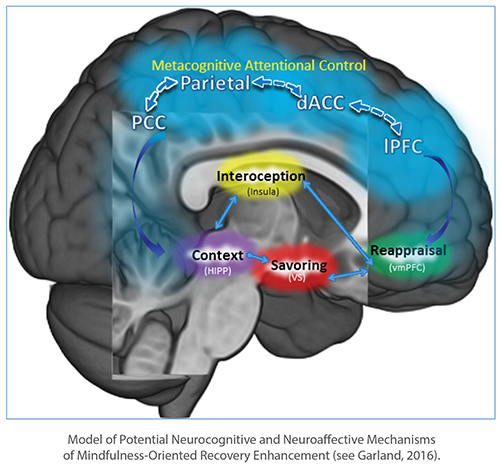$3 Million Grant To Study Mindfulness-based Treatment Of Opioid-treated Chronic Pain
Chronic pain is often treated with extended use of opioid analgesics, yet these drugs can alter the brain in ways that make it difficult to cope with pain and experience pleasure in life. Mindfulness-based interventions may be an effective means of addressing these issues, but research is needed to understand how such interventions change the brain to reduce suffering.
To that end, in September, 2016, University of Utah College of Social Work Associate Dean for Research Eric Garland was awarded a five-year phased innovation grant from the National Institutes of Health’s (NIH) National Center for Complementary and Integrative Health entitled Effects of Mindfulness-Oriented Intervention on Endogenous Opioid Mechanisms of Hedonic Regulation in Chronic Pain (R61AT009296). The objective of the project is to study the effects of an innovative mindfulness-based intervention on brain mechanisms linked with pain and pleasure.
 In the first two-year phase of the study ($800,000), Garland (Principal Investigator)
and Jon-Kar Zubieta (Co-Principal Investigator), chair of the University of Utah’s
Department of Psychiatry, will use positron emission tomography (PET) neuroimaging
to assess the effects of Mindfulness-Oriented Recovery Enhancement (MORE) – an innovative, mindfulness-based treatment modality developed by Garland
– on restoring brain levels of endorphins in patients with chronic back pain who are
being treated with prescription opioids.
In the first two-year phase of the study ($800,000), Garland (Principal Investigator)
and Jon-Kar Zubieta (Co-Principal Investigator), chair of the University of Utah’s
Department of Psychiatry, will use positron emission tomography (PET) neuroimaging
to assess the effects of Mindfulness-Oriented Recovery Enhancement (MORE) – an innovative, mindfulness-based treatment modality developed by Garland
– on restoring brain levels of endorphins in patients with chronic back pain who are
being treated with prescription opioids.
This study represents the first use of PET to quantify the effects of a mindfulness-based therapy on levels of endogenous opioids in the brain.
Garland and Zubieta will also use functional magnetic resonance imaging (fMRI) methods to assess how mindfulness training through MORE may increase people’s capacity to savor natural pleasure from positive and meaningful events in everyday life – a capacity that becomes diminished over time through the deleterious effects of chronic pain and prolonged opioid use on the brain. This study aims to test whether MORE might reverse this insensitivity to natural reward by targeting the endogenous opioid system and the brain reward functions.
Following a successful first phase of the project, a three-year second phase ($2.2 million) will investigate whether patients with a particular genetic makeup that affects the expression of opioid receptors in the brain might benefit more from the mindfulness-based treatment. The second phase of the project will also assess the dose of mindfulness skill practice as a predictor of changes in endogenous opioid function and clinical correlates.
Based on the results of previous research, Garland hopes that with this grant, he will find evidence that mindfulness meditation training through MORE will restore proper function to the brain’s opioid receptors. “We will be able to measure how MORE changes the brain’s ability to regulate pain and respond to natural rewards, as well as deepen our understanding of exactly how these changes in neural mechanisms happen,” said Garland.
Overall, this project will unite expertise in mindfulness-based interventions with expertise in neurogenetics and the use of PET and fMRI to probe the neurobiological mechanisms of pain and emotional experience. By elucidating a key mechanism of meditation-based intervention, this program of translational research will further the emerging field of social work neuroscience and enable Garland to rapidly optimize MORE to increase the effectiveness of the intervention as it is rolled out in clinical practice.
CSW Research News
Categories
Tag Cloud
- criminal justice (1)
- homeless (1)
- Pay for Success (1)
- Salt Lake County (1)
- recidivism (1)
- housing (1)
- Anderson (1)
- Foster (1)
- Alzheimer's care (1)
- National Institute on Aging (1)
- NIH (2)
- dementia care (1)
- mobile technology (1)
- ViSUS (1)
- Garland (1)
- NIDA (1)
- MORE (1)
- opioids (1)
- addiction (1)
- hedonic regulation (1)
- neuroscience (1)
- integrative health (1)
